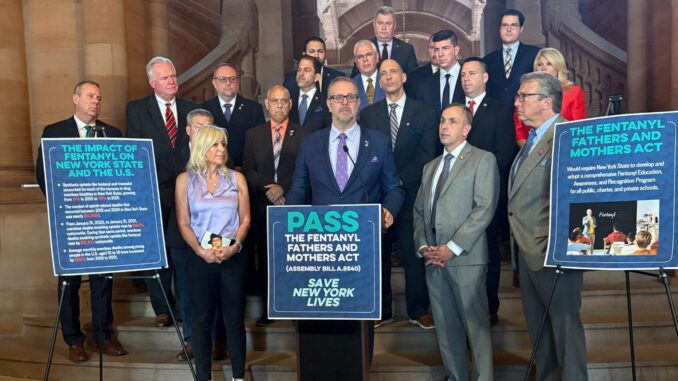
By Thomas Montana
Assemblyman Keith P. Brown (R,C-Northport) knows what the effects of fentanyl can do to a person. His nephew, Jesse Romanasky, died from a fentanyl overdose just four weeks shy of his 20th birthday. So for him, he said he was quick to support the Fentanyl Fathers and Mothers Act.
“I’m proud to co-sponsor this bill. For Jesse,” Brown said. “For every student who still has a chance. Let’s act now, and let’s save lives.”
Fentanyl Fathers and Mothers Act is a comprehensive proposal to combat the fentanyl crisis education, prevention and mental health support in New York’s schools. The bill would require the creation of a statewide Fentanyl Education, Awareness and Recognition Program for students in grades six through 12 across all public, private and charter schools.
“But like too many kids, [Jesse’s] path to substance use started young — vaping at 14, marijuana at 15, pill parties by 16 and then hard drugs at 18. Two years later, he was gone,” said Brown. “This legislation has to be about more than saying ‘don’t do drugs.’ We need to equip students with the tools to manage emotional pain, anxiety and stress, the things that so often drive kids toward dangerous substances in the first place.”
Brown said his sister believes that Jesse suffered from undiagnosed bipolar disorder, something they came to understand too late. He said this is why he is calling for the bill to go beyond just drug warnings, and to incorporate real mental health education and emotional skill-building into school curriculums.
The Fentanyl Fathers and Mothers Act would mandate:
- Age-appropriate instruction on the dangers of fentanyl and synthetic opioids
- Naloxone (Narcan) training and distribution in schools
- The inclusion of bereaved parents to share personal stories and humanize the crisis
- A requirement for the Departments of Education and Health to jointly develop and implement the curriculum
- State funding for educator training, curriculum development and naloxone access
Brown is advocating for schools to go further by incorporating:
- Mental health education that helps students recognize emotional distress in themselves and others
- Coping strategies for managing stress, peer pressure and trauma
- Empathy-based learning to help students understand the broader consequences of their actions and how substance abuse can devastate families and communities
“Jesse was loved deeply. And when we lost him, it didn’t just take one life, it shattered so many others,” Brown said. “Our children deserve to understand the risks and realities. But they also deserve support, compassion and tools to navigate a very complicated world.”

